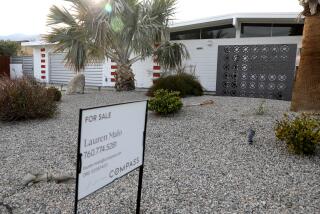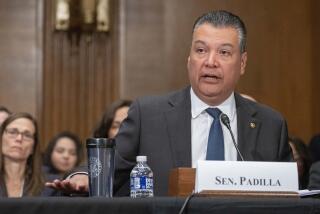Hanging On After the Big Hang-Up
- Share via
Telemarketers are an optimistic sort. They’re quite certain they can call you up, drag you away from whatever you were doing and sell you something you didn’t know you wanted.
So maybe it’s not surprising that many say they’re not worried about a new law that will fine them as much as $11,000 each time they call someone listed on a federal do-not-call registry.
Some telemarketers almost give the impression that the National Do Not Call Registry, which goes into effect Oct. 1 and so far has 31.6 million phone numbers, was their idea. They say it will greatly simplify their operations by drawing a bright line between those who don’t want to be called and all the others -- who, the telemarketers will assume, are downright eager to talk.
“The individuals left are more of a targeted, receptive population,” said Alan Elias, a spokesman for Providian Financial Corp., a San Francisco credit card company.
Other major telemarketers say they support the registry because they believe in consumers’ right to be left alone.
“This is quite in line with AT&T;’s long-standing policy of protecting the privacy of its customers,” said Tom Hopkins, a spokesman for AT&T; Corp., one of the nation’s largest telemarketers.
If the industry seems cool and unconcerned, its lobbyists are close to panic. The American Teleservices and Direct Marketing associations have filed lawsuits to stop the registry, which they say is a violation of free speech.
They also say the registry will ruin the industry, in turn delivering a body blow to the wobbly national economy.
“It will be like an asteroid hitting the Earth,” said ATA Executive Director Tim Searcy. “Two million people will lose their jobs.”
Which group is right will begin to come clear this fall. Federal Trade Commission officials originally predicted that consumers would put 60 million phone numbers on the registry in the first year. They say registrations -- which can be done on the Web at www.donotcall.gov or by calling (888) 382-1222 -- are exceeding expectations. There are 166 million residential phones in the U.S.
Telemarketers will pay to access the registry, which will be updated quarterly. Only politicians, pollsters and charities will be exempt and able to continue to make calls with impunity. Also permitted will be calls to consumers with whom the telemarketer has an existing “relationship.” But even here there are limits.
“Telemarketers can’t sell another product or service that is completely unrelated,” said Eileen Harrington, the FTC’s associate director of marketing practices. “If I’m your phone company, I can’t sell you a time share.”
In coming weeks, households can expect to be deluged with phone solicitations as telemarketers try to establish relationships before the registry goes into effect. The FTC already is getting reports that telemarketing call volume has soared. And after Oct. 1, those who haven’t signed up for the registry can expect a flood of calls as marketers zero in on them.
Consumers must sign up by Aug. 31 to be on the registry by Oct. 1. Those who sign up thereafter will have to wait three months before their numbers appear on the registry.
Harrington declined to say how she thought the law might affect the telemarketing industry. The lobbying groups say about 4 million people work in telephone sales, calling consumers or businesses with offers for products such as newspapers, magazines, mortgage refinancings, stocks, insurance and long-distance phone service. Some salespeople work directly for the company that makes the product or provides the service being touted. Others are employed by independent call centers hired by contract.
“The impact on jobs wasn’t the primary consideration here,” Harrington said. “It was consumer privacy.”
Attention Getter
Telemarketing first took root in the 1970s. Hiring people to work the phones was cheaper than sending out door-to-door salespeople or mass mailings or buying television time.
“It’s highly cost effective,” said Michael Snavely, a vice president with Bankers Life & Casualty, a Chicago insurance company. “It’s easy to make adjustments on the fly -- you can change something and be up and running again the next day. You can’t do that with TV ads.”
And a ringing telephone, of course, is much harder to ignore than a TV pitch.
“It’s a great way to get people’s attention,” Snavely said.
The first telemarketers either bought numbers from list brokers or simply dialed sequentially, hoping someone would answer so they could start their spiel. Though some early telemarketers were perfectly polite and straightforward, others weren’t. And the unpleasant callers weren’t necessarily just from the fly-by-night outfits.
“A lot of Fortune 500 companies have engaged in aggressive and unwise telemarketing practices,” the FTC’s Harrington said.
Three years ago, the FTC said, there were 35,000 allegations of telemarketing fraud. After a dip in 2001, the number soared to 55,000 last year. When ranked by category, the two top sources of complaints in 2002 were “advance fee” loans, followed by sweepstakes whereby the “winner” had to pay a fee to claim the “prize.”
Complaints about invasions of privacy aren’t officially tracked by the FTC, but the agency says they have mushroomed in recent years -- a consequence of the number of calls being placed as well as of the technology that makes them possible.
Many telemarketers use a device known as a predictive dialer, which queues up numbers. If a salesperson isn’t ready or if too many people answer their phones at the same time, a call is “abandoned.” For many people, the only thing as annoying as answering the phone and finding a marketer on the other end is answering the phone and finding dead air, courtesy of a marketer too busy to talk.
When the FTC was considering the national registry, it solicited input from the public and received more than 64,000 comments, more than in any proceeding in the agency’s history. The vast majority supported the idea of a registry. Many denounced telemarketing in blunt terms.
One 48-year-old former telemarketer wrote that “98% of all products sold by [telephone sales representatives] are products that you don’t need or will never use. However, we are specifically taught to harass you till either we can con you or you just get tired of hearing from us [and] you sign up anyway.”
The telemarketing industry says it places about 70 million calls to consumers a day. Fewer than 1% result in sales, but that still means more than $100 billion worth of business annually.
“This thing works,” the telemarketing association’s Searcy said. “People say, ‘I don’t buy anything over the phone.’ But they just don’t think the calls where they make a purchase are annoying.”
One industry that has grown up alongside telemarketing is the time-share business, which sells small ownership shares in resort complexes.
California has 125 time-share resorts, the second-highest total after Florida and the largest number of owners -- 270,000, according to industry statistics. The more farsighted time-share operations, or maybe just the luckier ones, have been moving away from cold calling.
Trendwest Resorts, which has eight condominium resorts in California, depends on cold calls for “less than 10%” of its marketing, said Vice President Jacqueline Maartense, who called the registry “a great thing.”
“It creates an opportunity for us to explore new ways to reach out to consumers,” she said.
The Redmond, Wash., company is part of Cendant Corp., which includes brands such as Avis and Budget rental cars, Ramada Inn and the Century 21 real estate brokerage. “We’re harnessing those relationships,” Maartense said. A real estate agent, for instance, could easily find out whether her clients were interested in a time share.
Independent time-share companies could be harder hit. Grand Pacific Resorts in Carlsbad, Calif., runs two telemarketing shifts a day, with 20 representatives for each stint. They place a total of 10,000 calls a day, from which they entice about 40 people to take a tour. One person, at most, may follow through and buy.
Grand Pacific, which says it is the oldest and largest “vacation ownership” company in the state, used to get its numbers of potential customers from street fairs and county fairs. The company would rent a booth and hold a sweepstakes for a new car or cash. Fair-goers would fill out an entry form to compete for the prize. A few weeks later, they would get a call from Grand Pacific inviting them to one of its eight resorts.
But the price of fair booths escalated as more companies sought to engage in similar types of marketing. So Grand Pacific began buying cold-call lists from list brokers.
“It started as a little supplement, 10% or 20% of the calls,” said David Surrey, Grand Pacific’s call center manager. “Now 80% of our calls come from lists we buy. The registry is going to impact us rather severely.”
A Taste for Spam
Surrey is hopeful that a lawsuit will stop the registry at the last minute. And if that doesn’t happen, he expects other methods -- e-mail, for example -- to blossom. “It’s not like we’re passing out pink slips saying, ‘On Oct. 1, half of you are gone.’ ”
Sterling Edens, who runs the 75-person call center for Welk Resort Group in San Diego, agreed that “the big bloodbath” wouldn’t happen immediately. “The first run will be a good thing,” he said. “It will eliminate a lot of people who just don’t want to be bothered no matter what you’re talking about. It prunes the tree.”
But this is an industry, regulators say, that never has been good at self-restraint. So the widespread presumption is that all those not on the registry will, as Edens puts it, “get overwhelmed with every type of telemarketing call imaginable.”
That will drive more people onto the list. Which in turn will increase the volume of calls to the dwindling number who aren’t on it.
Last-Ditch Effort
But for the next six weeks, it’s open season. Dozens of people report to the FTC every day that telemarketing calls to their numbers have tripled or quadrupled. Some wonder whether telemarketers have somehow hacked into the do-not-call registry and are purposely calling numbers on the list.
A spokesman for AT&T;, which administers the registry for the government, said the hacking allegations were “not true.”
Last month, AT&T; was sued by Missouri’s attorney general, who alleged that the company violated the state’s do-not-call list. AT&T; said it was surprised by the suit. AT&T; does not administer the Missouri list.
A likely explanation is telemarketers’ desire to set up as many relationships as possible before Oct. 1.
If this industry is fated to disappear, the telemarketing association says, it will go down dialing.
“Until every man, woman and child in the United States signs up for a do-not-call list,” the ATA’s Searcy said, “the opportunity still exists.”
More to Read
Inside the business of entertainment
The Wide Shot brings you news, analysis and insights on everything from streaming wars to production — and what it all means for the future.
You may occasionally receive promotional content from the Los Angeles Times.









